Roxanne Shanté is seated near the front row inside the Wilshire Ebell Theatre in Los Angeles, where she’s minutes away from receiving a Grammy Lifetime Achievement Award. She’s accompanied by her Rock The Bells radio show co-host and Biz Markie’s former DJ/friend, DJ Cool V. With her hair placed perfectly on top of her head and a smile that lights up the room, Shanté sits confidently, knowing this moment—decades in the making—is for her.
The 2025 honorees include Prince, the Clash, Frankie Beverly, Frankie Valli, Bobby Jones, and Taj Mahal, artists who made a significant impact—just like Shanté did on hip-hop. She waits patiently as Chuck D inducts the Clash, decorated producer Glyn Johns receives the 2025 Recording Academy Trustees Award and Mahal, flanked by his daughters, delivers a moving speech. Once Shanté hits the stage, it’s official—she’s now the first solo female rapper to receive a Grammy Lifetime Achievement Award.
More from Spin:
- Weezer Still Playing Coachella After Bassist’s Wife’s Shooting
- Pulp Prepare First Album Since 2001
- Kokoroko Hang ‘Tuff’ On Upcoming LP
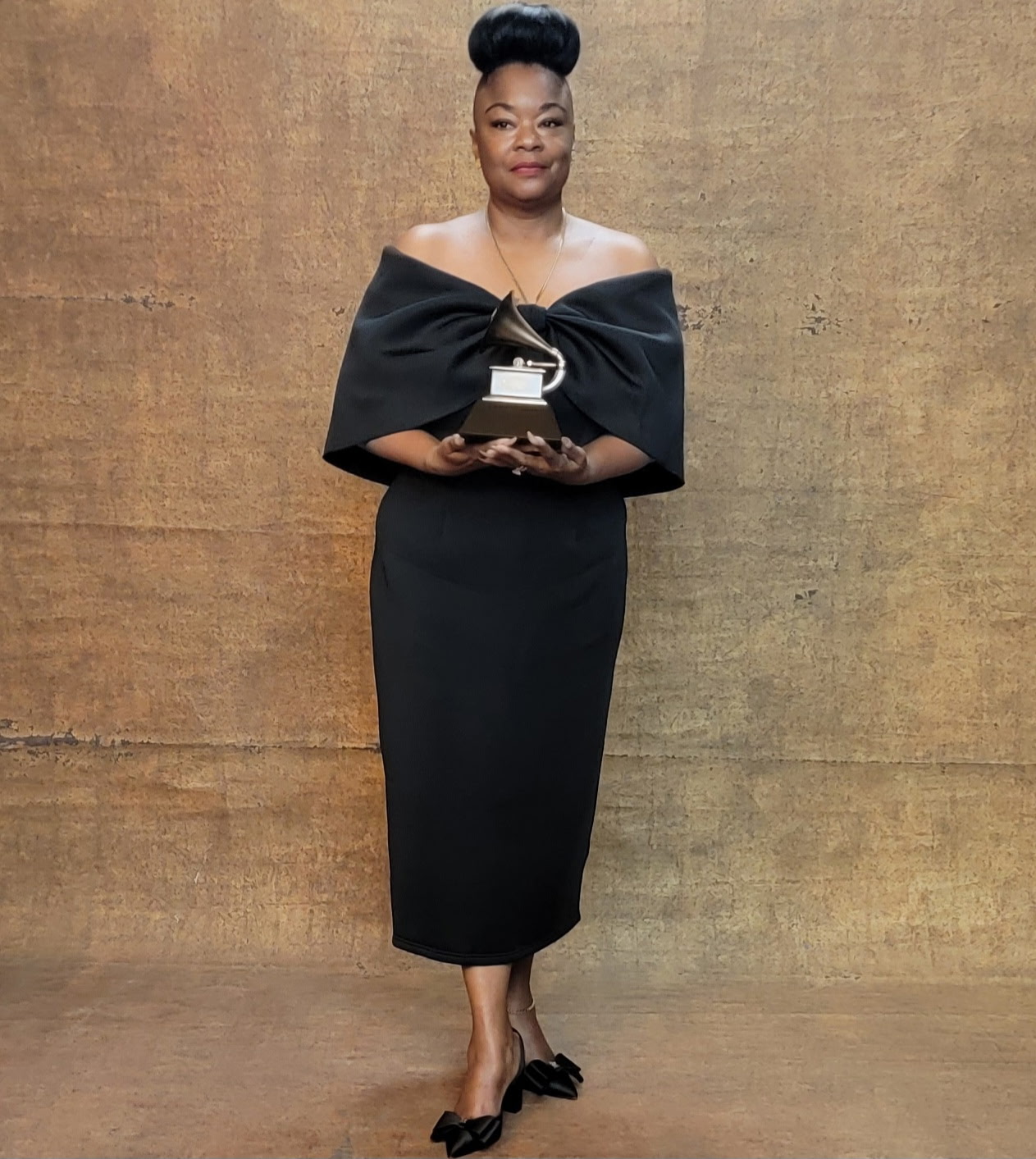
Shanté’s road to the Grammys began at the Queensbridge housing projects in 1984, when a chance encounter with New York City hip-hop pioneers Mr. Magic and Marley Marl led to her recording one of the most notable diss tracks in the genre’s history, “Roxanne’s Revenge,” sparking what would become the “Roxanne Wars.”
Shanté, who was a member of the hip-hop collective the Juice Crew alongside Big Daddy Kane, MC Shan, Marley Marl, Mister Cee and Kool G Rap, among others, was just a teenager at the time. She was known for her fearless battling style and quickly earned the nickname “Queen of Rap.”
In 1985, she battled Busy Bee Starski for the title of “best freestyle rapper” but lost after Kurtis Blow voted against her, a decision he later admitted was based on her gender—not on skill. It was one of the only battles she ever lost. Still, to this day, she refuses to lose another one. She’s beat breast cancer—twice—and, despite her tumultuous childhood, has come out on top.
The Grammy was the cap on a whirlwind year for Shanté. Just months earlier, the Paid in Full Foundation gave her the Hip Hop Grandmaster Award, which came with life-changing money. Not only can she focus on her radio show, “Have a Nice Day,” she can, as she said, “sleep” instead of “rest.”
During our candid interview, Shanté opened up about her bout with cancer, the infamous Busy Bee Starski battle, losing her mother, and how the pound cake at Alcoholics Anonymous meetings once kept her fed.
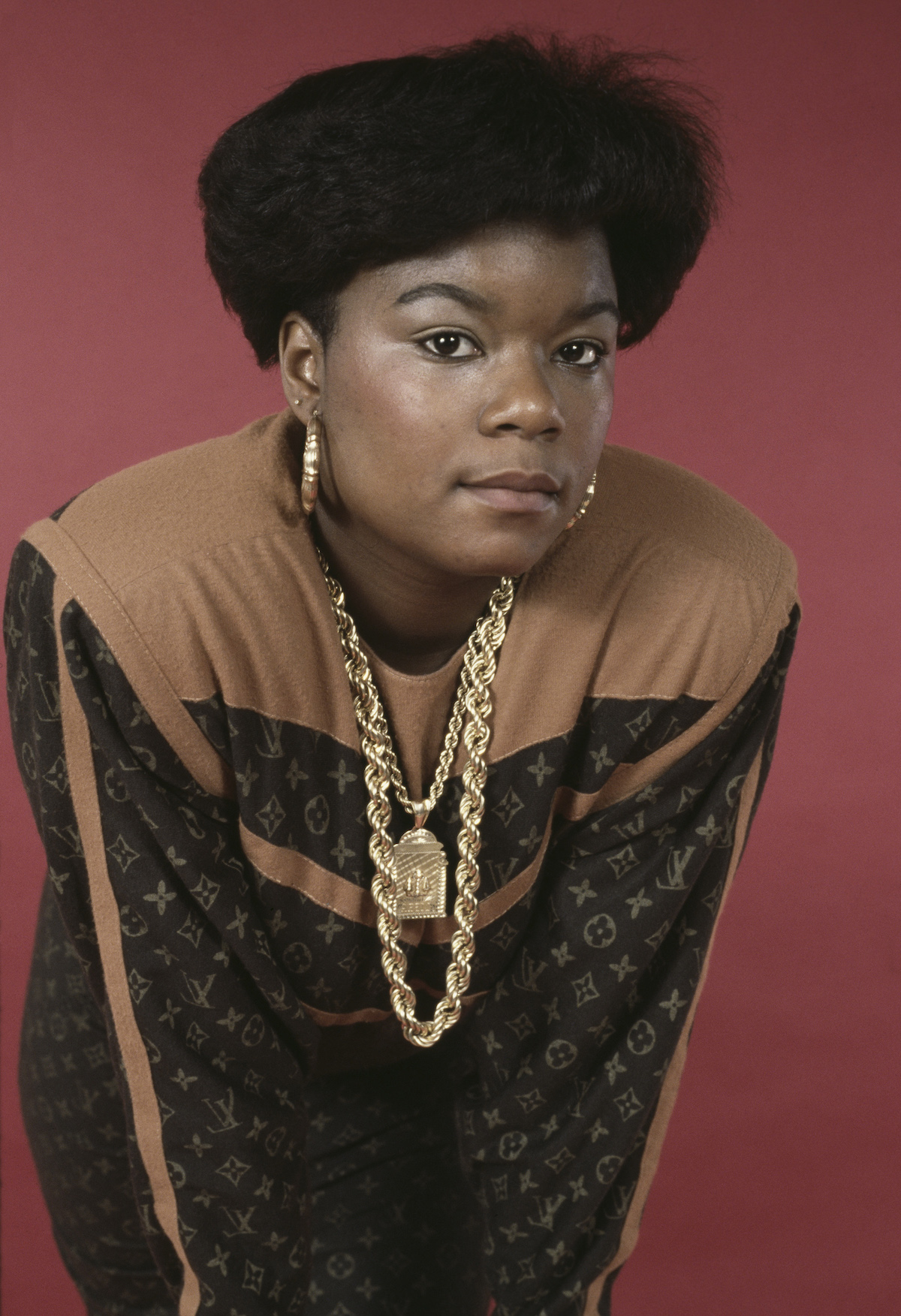
SPIN: I don’t know how you feel about aging, but the older I get, I’m not as hyped about birthdays.
Roxanne Shanté: Honestly, I’ve never been really hyped about them. Growing up, I really didn’t have birthday parties and things like that. I started working when I was so young, so every time my birthday came around I was literally working.
How did you react when you found out you were getting a Grammy Lifetime Achievement Award?
I was really shocked at first. I thought about the class that I was in. I was like, “Wow, this is an incredible class to be an honoree and to be a part of with Prince, Frankie Beverly, Frankie Valli, Taj Mahal, and the Clash. When you think of all the accomplishments of such great entertainers, and such great writers and producers and then to add Roxanne Shanté to that, it just made me feel even more special.
What was going through your mind as you’re sitting there watching everyone get their awards?
It just felt really special to be there. It was my first time going to the Grammys and leaving with the Grammy made it incredible.
Would little Roxanne Shanté ever have imagined this growing up in Queensbridge?
I think every artist imagines that, because every artist wants to achieve that. It’s a way of receiving accolades from not just the fans and those who purchase your albums and love your videos and sing your songs, but also those who write songs themselves. So to have the Recording Academy acknowledge you is just something really special. I think it’s something that every artist looks forward to because then it means that you’re not just looked upon as a great artist by fans, but you’re also considered a great artist by artists and your peers.
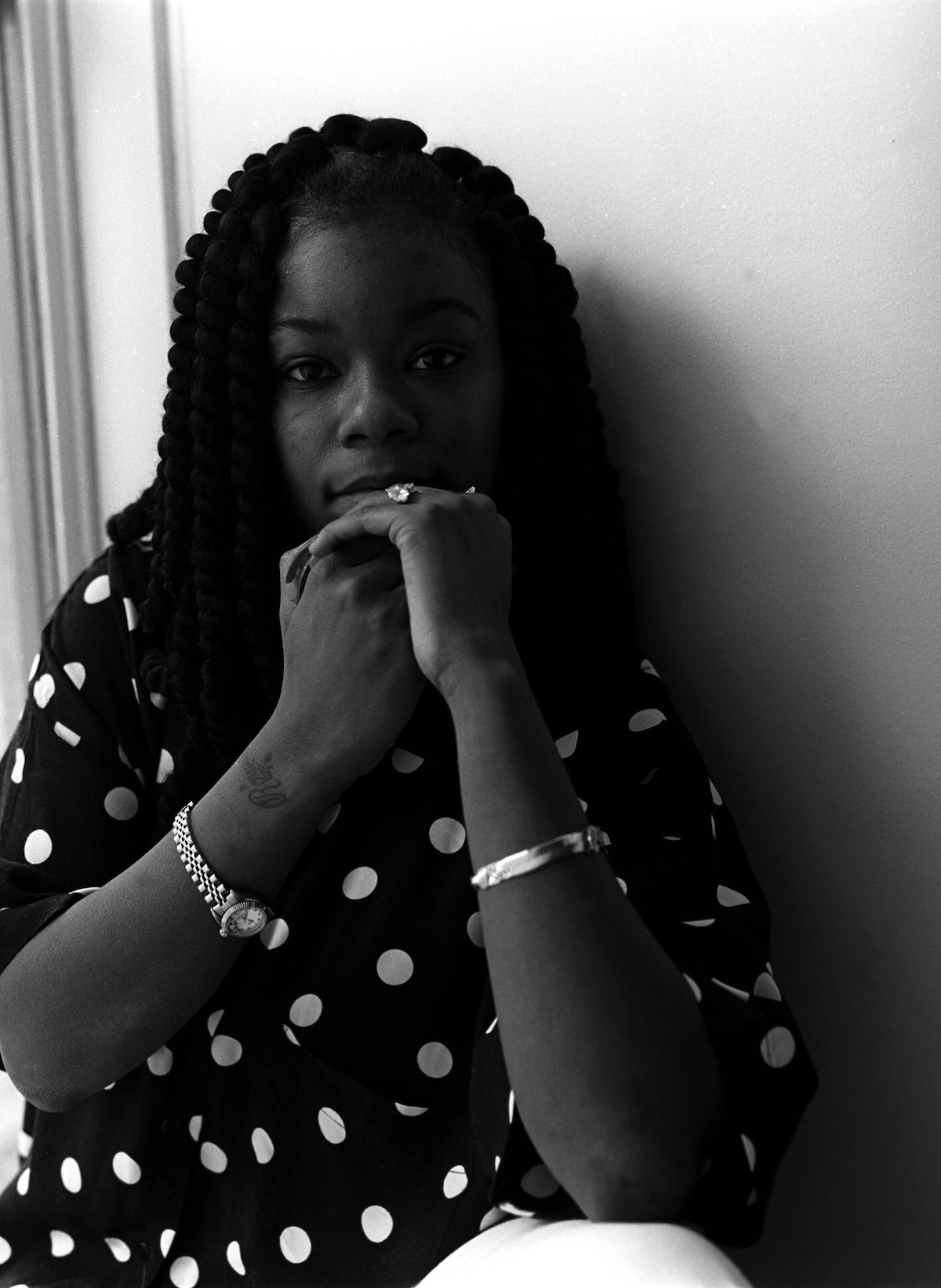
I was watching the CBS interview you did with Gayle King. Walking through your old stomping grounds, what memories came up?
I had recently lost my mom and so we closed that apartment down. Every day I kind of regret it. I wish I would have kept the apartment, but I also understood that it is really meant for a stepping stone for a new family. Now there’s another woman who lives there who has daughters, too.
I was saying how ironic it is that now we leave the apartment and then all of a sudden the first person to move in is a woman who’s kind of the same way my mom was—a single mom with daughters—and I just thought that was a sign that it was time to let it go. When I walk through the projects, it’s like going home and seeing family. Literally, it’s like a family reunion. I still frequent there. I get a chance to see everybody and still participate in everything.
That’s really cool of you to go back. You said you’re QB until you die. I know your childhood was a little rough and you encountered a lot of challenges. What do you think those challenges did for you though?
I think character building. There’s a lot of times when you’re gonna get to certain places in your life and you’re gonna have to make hard decisions, and when you gotta make those decisions, those decisions really determine what your character is going to be. It could be a time where you’re outside and you have a whole sandwich to yourself, but then you see someone who doesn’t have anything to eat. So instead of you just saying, “OK look, I got me a sandwich, I’m just going to be selfish,” you divide that sandwich in half. Sometimes you divide that sandwich into fours, but then you start to realize that it’s better to eat with everyone than to be selfish and eat alone. There’s a lot of things that you learn when you’re out there on your own very young.
Actually, you learn a lot of respect. You learn a lot of respect for elders, but you also learn a lot of forgiveness.
It sounds like you had to do a lot of forgiveness early on. When did you lose your mom?
Three years ago.
I lost mine five years ago and I’m still in shock.
I still have the voicemails in my phone and I remember about a year ago, I had to go get a brand new phone. For some reason, all of her voicemails had started playing and I went through a full panic and was like, “I gotta get a new phone.” You never want to delete anything, but then you figure out that you don’t even have the heart to take the time out to transfer everything because when you try to transfer it, you got to listen to it. My mom had the same phone number for over 50 years and I kept the phone number, but my children made me give it up. My children were like, “When somebody dials that phone number, they’re not calling for you. You have to move on. Like that phone call is not for you.” That was them calling Gigi—they call her Gigi—that phone call was meant for her. So you’re not letting her actually rest in peace because you keep so much of her attached here. Everybody else said how much they seen my mom in their dreams, but I haven’t seen her yet really in three years.
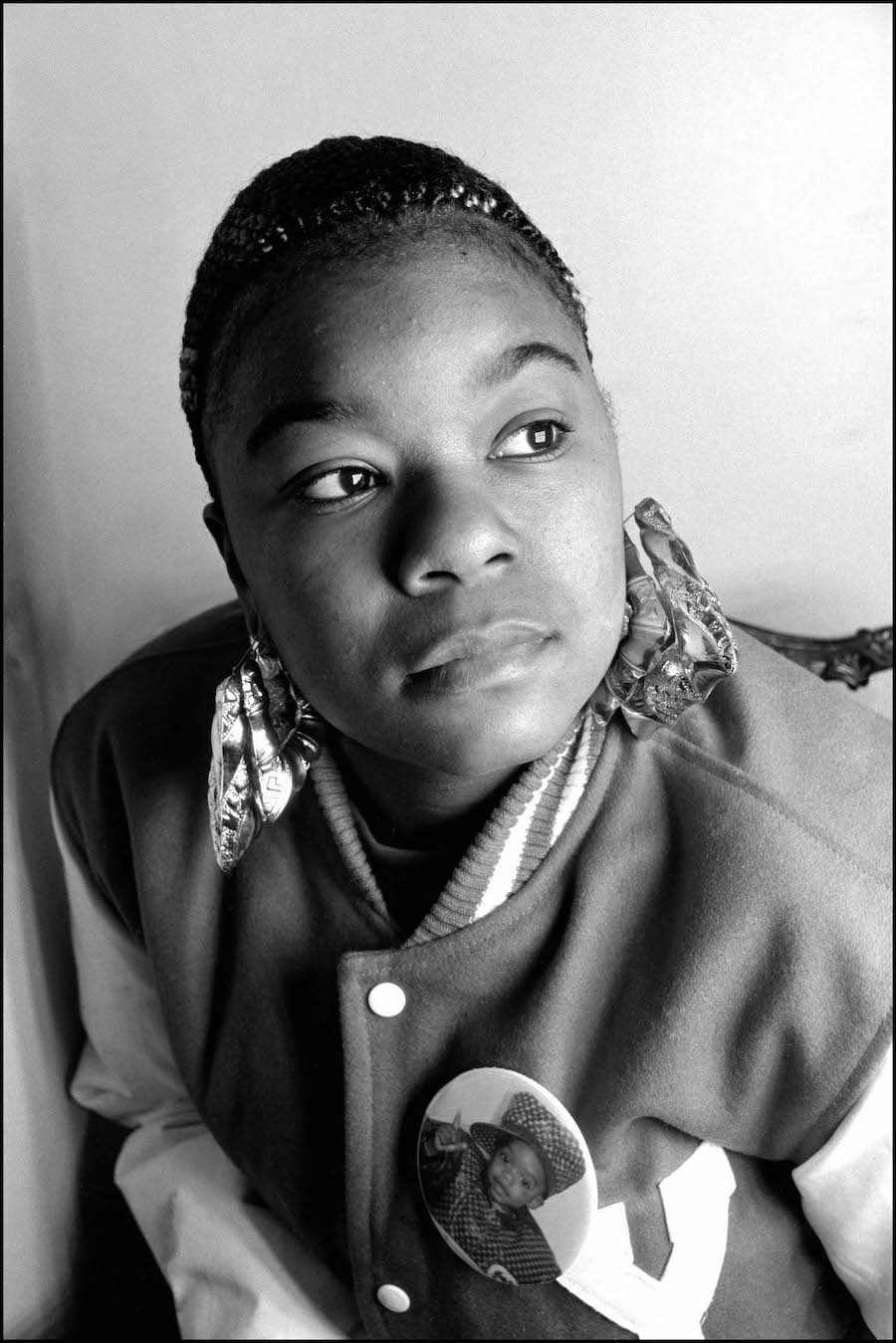
Oh wow. I started dreaming about her right away.
So did my niece and my sisters. They all said, “Oh I dreamed about mommy last night.” And I’m sitting there like, “Why she hasn’t came to see me?” They dreamed so much about her death, but I had so much of her in life.
What was your relationship like?
It was complicated during my teenage years. In the beginning, it was incredible. I went everywhere with her. We did everything. She made sure that we were really cultured. We did a lot of traveling and everything else. Circumstances came about when I was about maybe 11, 12 years old, so then it was difficult. But then we got back close again because, again, you understand forgiveness, you understand circumstances and situations and things that can happen. Once I became a woman, I understood what a heartbreak could do, what a heartache could do, just what certain things could do.
It’s easier to understand once you get older.
There was a lot of forgiveness on my end too, just because I understand life isn’t easy—it’s hard.
When you became a mom at 16, how did that change your life and how did that impact your career?
It just made me understand that it was very important to really concentrate on being responsible for someone else. I had already been responsible for my sister, so I knew what it was like in order to raise them and in order to step in and be a mom. I’ve been a mom longer than I’ve been anything else. It did show me that my trust factor for people changed a lot. Once I had a son,
it got a little different.
Is it true you only trusted Big Daddy Kane to babysit and one other person?
I trusted all of my hip-hop brothers, honestly. The Juice Crew could definitely watch them. I wasn’t big on anybody else. Most of the time if I travel with Kane, MC Shan, or Biz, then they would hold the baby while I’m on stage. But no, I wouldn’t give him to anybody else. I wouldn’t let anybody else hold him, no.
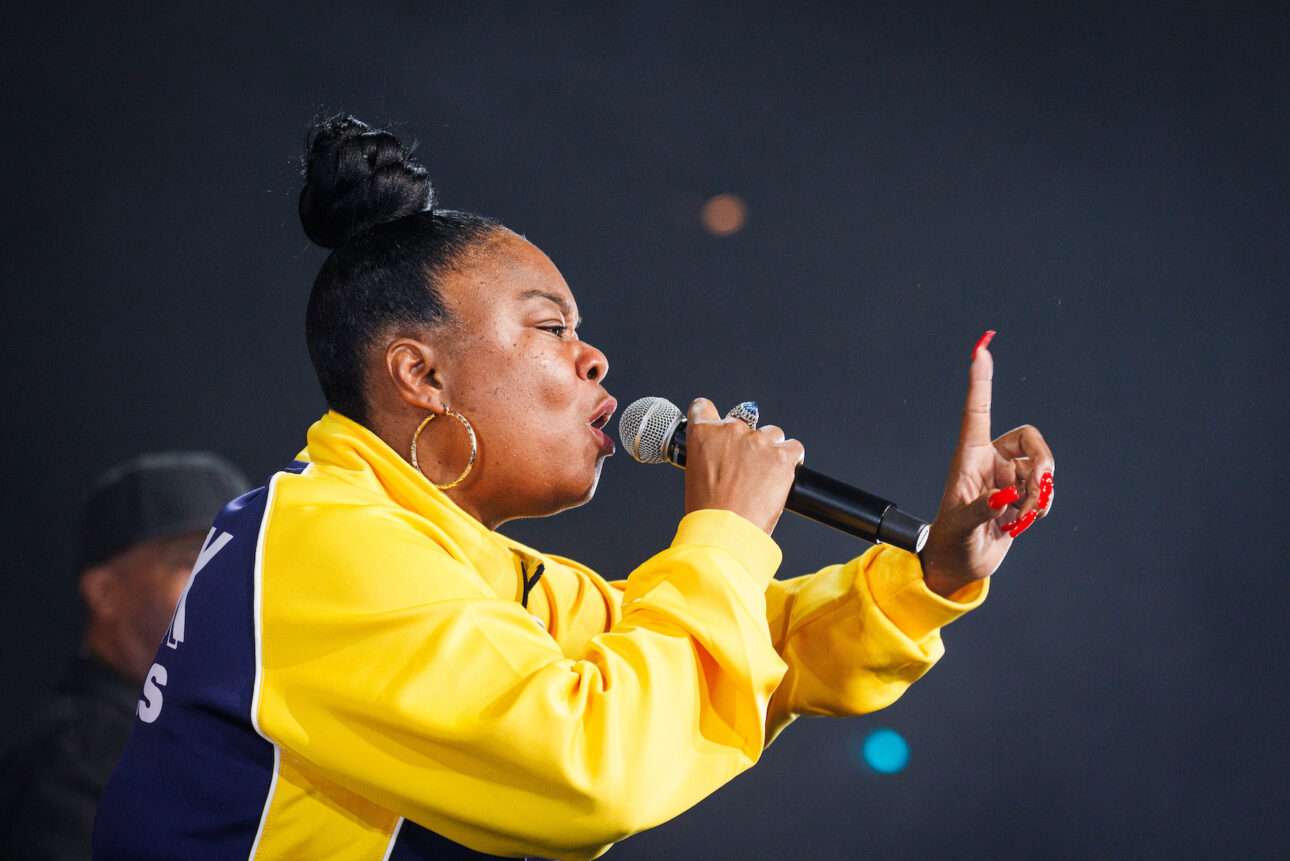
Being one of the only women in the Juice Crew, that must have been such an interesting experience because, in a way, they all became your brothers.
Absolutely—and still are today.
Losing Biz Markie was such a devastating blow to hip-hop, but to you specifically and to the Juice Crew. How did you cope?
There was so much loss, because within that same timeframe of losing Biz, I had lost two best friends, my dog, and then my mom. It was a lot going on. I didn’t have a break in grief for almost a year ’cause everybody seemed to be just passing away. I lost two uncles and my grandmother, too. My childhood was slowly disappearing, and what it did was it made me really embrace my present day. I learned to really enjoy doing the radio. I learned to really enjoy having a nice day. I learned to really enjoy making other people smile.
And that was because I was suffering so much loss. I’m one of those people who go through extremes; either I’m gonna be very, very sad or I’m gonna be very, very happy. And so I said, “OK, this is what we’re going to do. I am going to start to make people very, very happy. This is what I’m going to do and then that’s when my calling started.” So losing Biz, I kind of just dove into the radio because I knew that performing, if I looked over on that side of the stage, that I would never see Biz walk across that stage again. When I knew that I would never see him walk across the stage again, I lost a certain desire for it, so I just went straight into radio.
I poured myself into work when my mom got sick. I’d be working from the ICU to distract myself from what was going on.
I did the radio show from by my mom’s bed. I have the pictures of me doing the radio show from by my mother’s bed while we’re literally waiting to see what is going to happen. She went into the hospital in February, they diagnosed her in March. We begged her to let us have her in April. They didn’t give her to us until May and she died in June.
Biking and music were the only things getting me through.
I became the Audible book queen. I must know every book on grief and every step you’re supposed to take, but honestly, that’s not how none of that works. What works is when you’re ready to take that transition when you’re ready to say, “OK, they have transitioned. Now I must transform.”
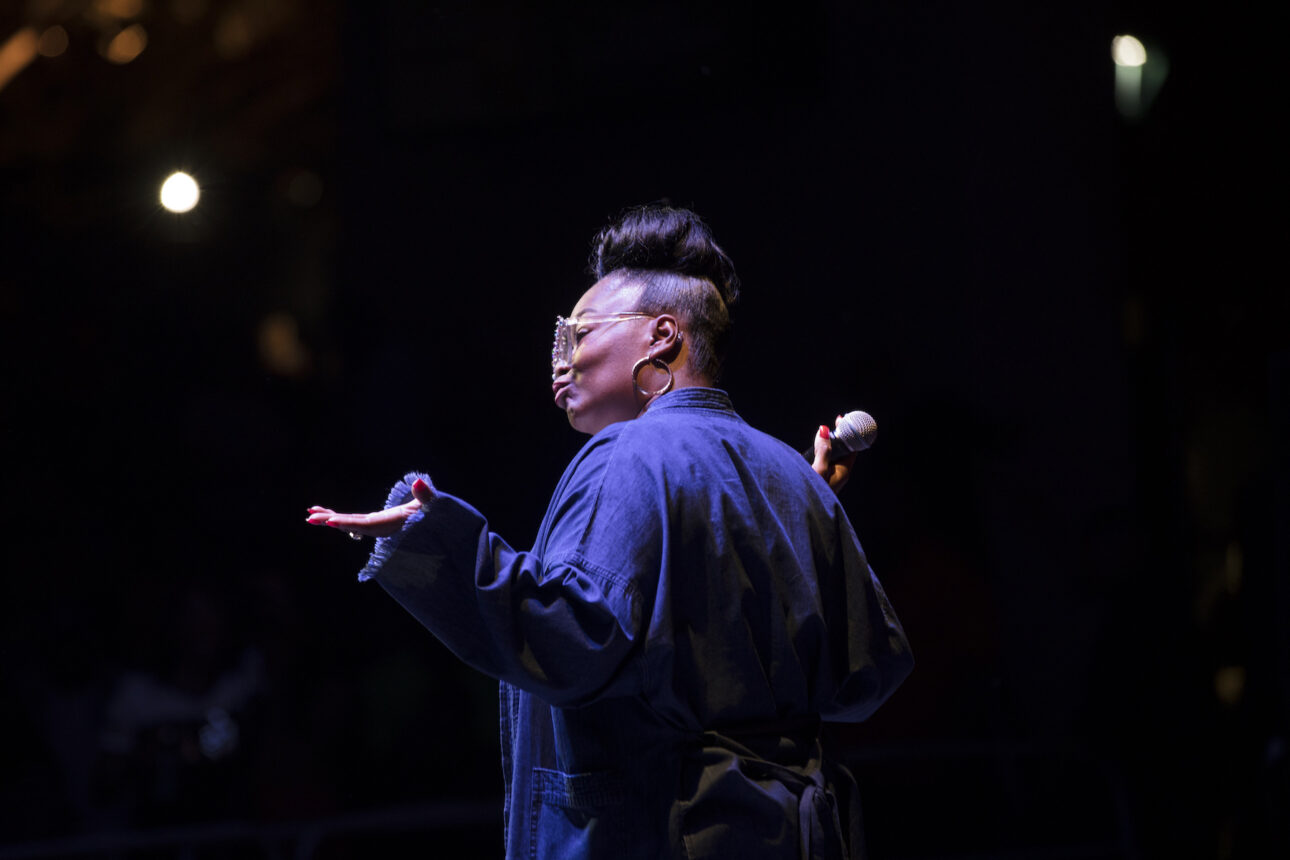
You said something in an interview where you were describing your “aggressive” style of battling, but really it was rooted in how you grew up and how you had to defend and take care of yourself. Can you speak to that?
People always assume that I was so aggressive, but they didn’t know what I was dealing with at home. They didn’t know what my life was like off stage. So on stage, it was literally like, “OK, let me just do this and let me just get this out the way so I can go back home.” I was always worried about if the children were safe. I can just assume that very few people came into the industry with as much on them as me at that age.
I’ve watched your 2017 biopic, Roxanne Roxanne, read about you, and we’ve talked before. You had a lot resting on your shoulders and grew up very fast.
Yeah, and so I suffer from a different form of arrested development. I understood I had to grow up but still now, it’s like, if I have a moment to make a decision, I might make a decision that would really satisfy the younger Shanté as opposed to the older Shanté.
Do you feel like that is like a little bit of impulsivity? How would you describe that?
I’m not impulsive because I think everything out. I think whether or not the consequences for anything I do is going to affect anybody else. I’ve always thought about everything I did whether or not it’s going to affect others, so I’ve always thought that part out so people are safe. I’m not going to jump in and do anything that’s going to hurt anybody, but it might be a time where I’ll say, “OK you know what? If I get up this morning and decide I want to go to Jamaica, I have put myself in a financial position where I’m going to Jamaica.” When they call me, they’re like, “Where are you?” I’m in Jamaica. “What are you doing there?” Whatever I want. Like, if I wanted to come here for a fucking beef patty and a soda, this is where I’m at.
Now you have the ability to do that. We’re going to get into that, but first I have to ask you about Kurtis Blow. The battle where he later admitted you won despite voting against you, did he ever give you a proper amends?
He definitely made a proper amends.
Tell me about that day.
I think what people don’t understand is—and again, this may be my level of forgiveness—when it comes to Kurtis Blow, he made a decision that day that had to be made for hip-hop. It wasn’t that he was being mean to Roxanne Shanté. It wasn’t that he was being cruel, or he was overlooking his hip-hop sister, or even didn’t understand what that was gonna do for me. What he really was doing was making a decision for hip-hop, something that was bigger and greater than both of us at that time. A lot of people be like, “Yeah, but your life could have been different.” Yeah, but my life could have been worse.
When I look at the outcome of my life now, it just shows me that all proper decisions were made, so I’m not mad at Kurtis. And even that day when he told me that I couldn’t win that day because I was a 15-year-old girl And hip-hop was just starting to be taken seriously, I understand now. The more I learned about the music industry, the more I understood his decision.
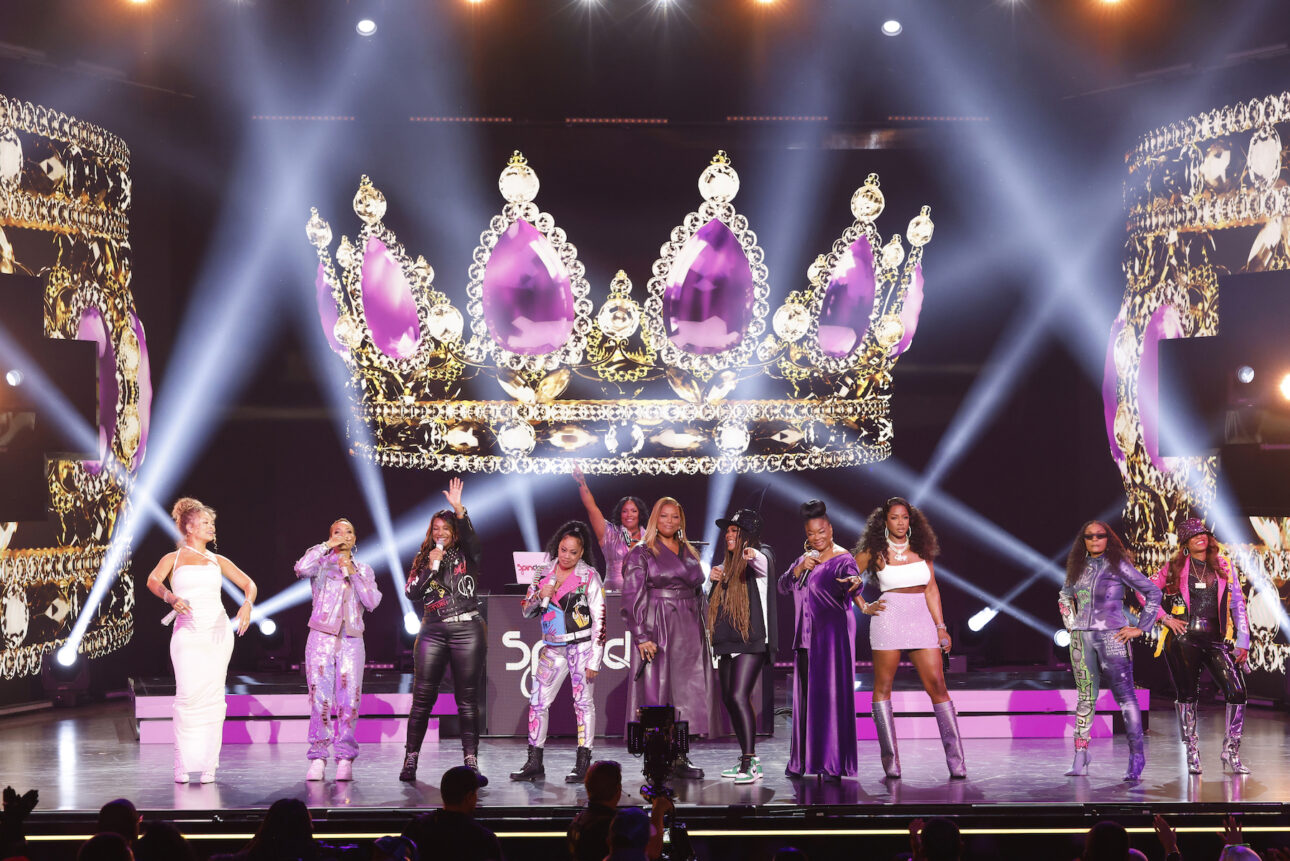
So he knew the music industry was already sexist against women and that a young woman winning this contest would reflect poorly in that sense?
It wasn’t about women. It was about the fact that hip-hop was a new genre of music that wasn’t taken seriously. It was made by poor black kids in a park who didn’t even have enough money for equipment, so people weren’t taking hip-hop serious. They kept saying, “Oh, it’s only a fluke. It’s a fad. It’s not going to be around long.” And now look, you can’t do anything without hip-hop today.
I love how so many people thought hip-hop had an expiration date like milk. Now here we are all these years later. You said recently you have your “happy ending.” The Hip Hop Grandmaster Award had a lot to do with that. When you found out about that, what was your initial reaction?
When it came to getting the Hip Hop Grandmaster Award from the Paid in Full Foundation, that award means more to me than anything else because that was an award from my peers. They understood everything that I’ve done and all the hard work that I put in. If no one else was going to pay me, if no one else was going to see my monetary value, they did. They saw everything that I was worth. They saw everything that I deserved and so they wanted to make sure that I had it before everything was done. They wanted me to know like, “Listen, we see you, we acknowledge you, we know what’s going on and we want to do this to make you happy at this point in your life.”
As I understand, that was life-changing money. How have you adjusted to that? I remember you saying you get sleep now instead of “rest.”
You take naps when you’re constantly trying to figure out where you’re going to go in life and what is going to happen and what you’re going to do. You’re always concentrating, so you never really get a chance to just sleep and see what it’s like to get to that point of being able to wake up when you’re ready. You’re always jumping. The money has allowed me to be able to do that. At this point in my life, I don’t have to worry about what am I going to do next. Before, I always had to worry about what I’m going to do next. So now it’s about living life and doing the things I want to do. And because you’re at a point of you doing things that you want to do, you do them even better because you do them with so much love. You do them for the people you want to do them for.
You once said you’ve been in survival mode your entire life. Was it difficult to let that all go because it’s been such a big part of you?
I still am in survival mode, it’s just that I have more tools to survive with.
You said one of the biggest battles you’ve ever faced was breast cancer. When were you diagnosed the first time and how did you cope?
I was diagnosed in 2008. I always looked at it this way—I have never lost a battle and I wasn’t going to lose that one either. I did whatever it took.
Did you take treatments?
Yes, I did. I did a biopsy. I had a lumpectomy. I had a partial mastectomy. I still have scars, but I also have the ringing of the bell and being on the other side. People always want to talk about the bad aspects of it. Let’s talk about the fact I went from walking walks to literally calling them struts, because I wanted everybody to feel this feeling—it made you value life. Some people don’t value life until they know that it can be taken. I have been loving life since I was 10 years old. When I say loving it, meaning I valued it. I understood what it was. I understood what a blessing a next day is. I understood what it is to know that tomorrow will be better.
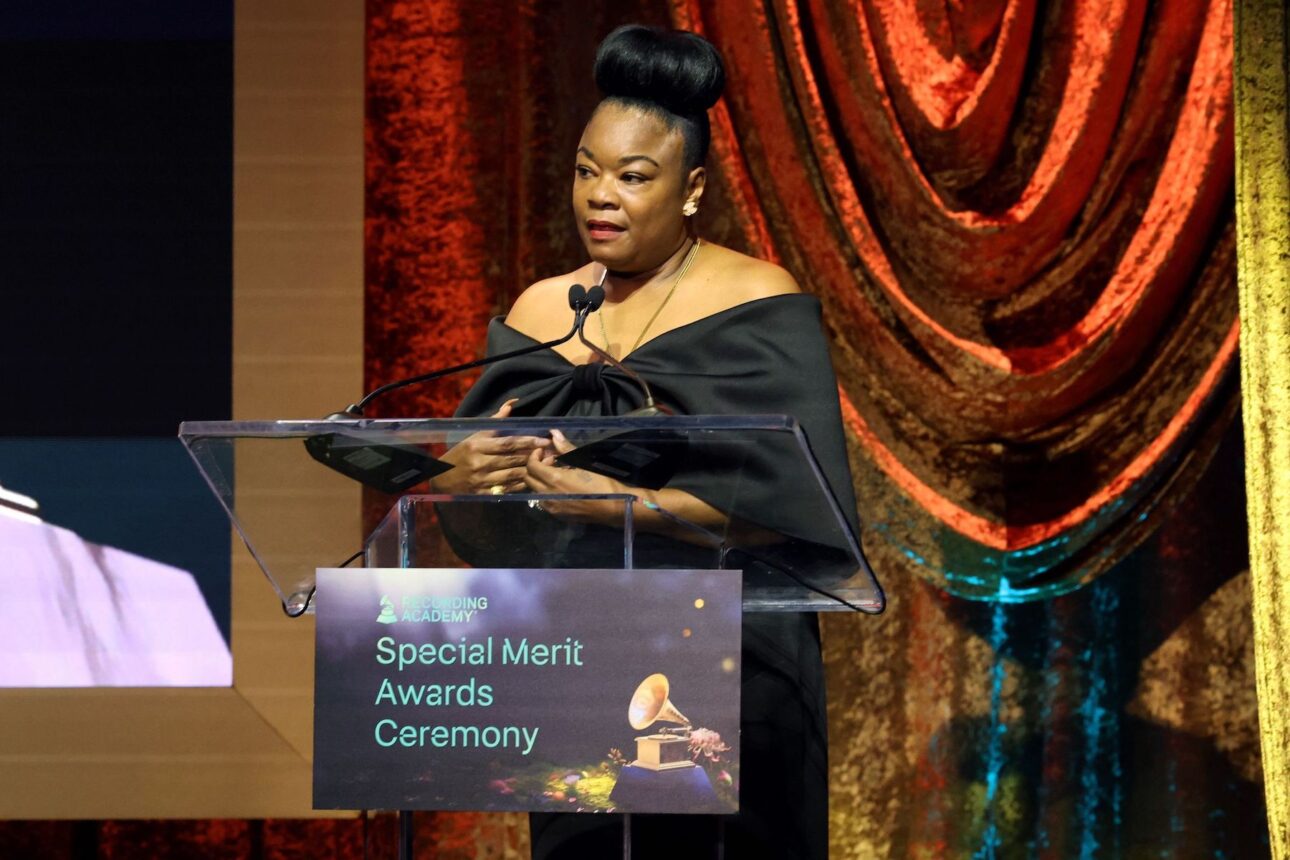
Were there moments where you were scared?
I was scared for my children because my daughter was very young and I just knew that I didn’t want her to be in this world without me. I know what this world can be like to a young girl and she needs me. That was my main thing. Of course my son, but for my daughter, she needs me. And even today, I’m blessed enough to have a neighbor who’s really a health nut. We get up and go to these different food stands and different stores and these different places and we go and get sour sop and she prepares sour sop. Now mind you, I’m no longer in the fight, but I still make sure that I live my life as if I am.
When my mom died, all of a sudden I felt like I was going to die, right? I started running.
And you feel amazing.
Yes, I just want to take care of myself and age gracefully. I don’t drink, smoke, or do drugs.
I don’t do anything either. I never did any of that.
I read that. I am so impressed. That’s hard to do.
I watched everybody around me, including many great entertainers, let this little powder just take them down. I watched some of the most beautiful people in the area that I grew up in smoke crack or go on meth. I never passed judgment. When I was younger, I used to live in the streets, or rather was homeless or however you want to say it, but when I was out there basically I remember going to AA meetings and having the cookies because they always had the best fucking cookies. You’d go there if you were really hungry, right? They’re gonna have hot chocolate, coffee, cookies, and somebody’s fucking pound cake.
Would you sit around and listen to some of the stories?
Oh, I would sit around and listen to some of the stories. Then when crack came out, they started having Cocaine Anonymous and all that other stuff. Now, the Cocaine Anonymous was a little different because they had finger sandwiches. They was a little different. For some reason, the people who sniff coke wanted to have fancy plates. The worst plate was Gamblers Anonymous; they had fucking peanuts and cigarettes.
Like a tray of cigarettes?
Yeah, like this must be the fucking Gamblers Anonymous meeting. I gotta sit. Let me wait for the alcoholics to get here [laughs].
You’re like, “I want that pound cake.”
Or give me some cookies. At least somebody’s mother gonna always give them a pound cake. For some reason, the alcoholics always had the pound cake.
That’s so funny.
But like I said, the Cocaine Anonymous, they was a little different. They was just a little more fancy. I don’t know why, but they just were.
You decided, “I don’t want to be like these people.”
It used to be so sad. It wasn’t what they did to themselves, it was more what they did to their family. And the families don’t wanna give up on them, because you feel like, “I can do this and I know that we’re gonna be all right.” Sill today, there’s a lot of my friends that call me up when they have their anniversaries. I go to their anniversaries, people will recognize me and be like, “Hey, Roxanne.” I say, “Ssh, it’s anonymous. Read the second word in this title.” And then they’ll start laughing.
I can just picture you smiling. You have the best smile.
You know what it is? Because I didn’t use my smile up. I’ve never had a fake smile. It was hard to find any pictures of me smiling early in my career because I never would smile. So if you caught me smiling, it’s a genuine smile. When people see me smile today, it’s because I have a whole lot of smiles saved up because I’ve never had a fake smile. I never fake it.
Congratulations on staying clean and sober your entire life. That’s not easy for some people.
A lot of people run from their feelings. I’ll be honest with you. I think I was afraid to ever take anything or do anything that was going to take me out of reality because I may have never wanted to come back. That was my biggest fear because it was painful living the life I lived as a child. It was painful going through everything I went through as a teenager, even a young adult. And there were times when you just be like, everybody that was high or drunk just looked like they didn’t care. Then when they sober up, the problem is bigger and the situation didn’t change. So it’s like, “Why should I do this?” Then you have to clean up, come back, and clean up this mess, when I can just stay this way.
But I’ve always been super supportive and never passed judgment on anybody; whether it was helping my drunk uncle get home or driving family members that had too much to drink home. I was underage and really shouldn’t have been driving, but that was the only way to get to the house. I think because of that, the universe has always provided for me. There’s never been a time where the universe didn’t just step in and say, “OK, I see you getting a little tired, I got you.” And I’d be like, “OK thank you, because I’m getting tired.”
I think when you do things for the right reasons, the universe rewards you.
I never do anything expecting anybody to pay me back. I do it because I’m supposed to do it. I do it because I felt like doing it. That’s the reason why I never talk about, “Oh, I helped this person and I helped that person,” because if I talk about it that way, then I didn’t really help them. I was really trying to help myself and they don’t know I did that to help them. That’s just me.
When did the breast cancer come back?
In 2018, but we were able to take care of it without having to go through the full treatment again. For every woman that’s out there who has went through breast cancer, don’t be scared to go and get checked out. Sometimes—and this is me being very personal—we get scared. We feel a lump or they send us back a letter telling us that there’s something abnormal or sometimes it says we got it. We got to stay on top of it. Getting to it early is the best prevention. That’s the best way to be able to take care of it. The sooner, the better, and that’s the truth.
I had my first mammogram a few months ago.
Did they smash your shit?
[Laughs] Yeah.
Oh, welcome to the club. She gave you a smash burger [laughs]. I know that was really, really awkward, but you know what, you got through it.
You’ve put in the work. You are a huge influence on so many women. Speaking of, it’s Women’s History Month. If you could have one message there, what would it be?
I would say that you are really a superhero, you have a super power, tap into it. You do have it. It’s just that we don’t take time out to find out what it is. So just take one day and realize what your super power is. It could be cooking, laughing, jokes, doing hair, writing, running. Whatever it is, you have a superpower because after all, you’re a super woman.
To see our running list of the top 100 greatest rock stars of all time, click here.



